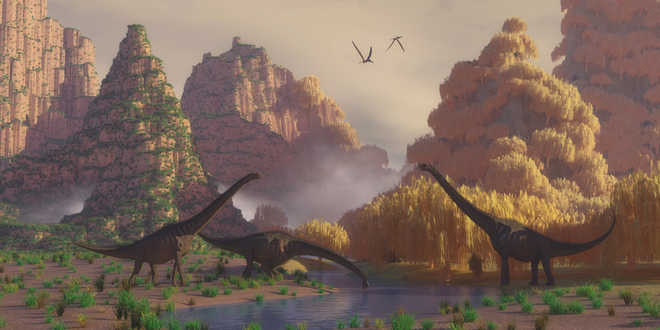
Thinkstock photo
Berlin, January 14
The well known asteroid impact resulted in long-lasting cooling on the Earth, which may have contributed to the sudden extinction of the land-living dinosaurs 66 million years ago, a new study suggests.
Death of the dinosaurs started the ascent of the mammals, ultimately resulting in humankind’s reign on Earth.
Scientists at Potsdam Institute for Climate Impact Research (PIK) in Germany reconstructed how tiny droplets of sulfuric acid formed high up in the air after the impact of a large asteroid and blocking the sunlight for several years, had a profound influence on life on Earth.
Plants died, and death spread through the food web.
Previous theories focused on the shorter-lived dust ejected by the impact, researchers said.
The new computer simulations show that the droplets resulted in long-lasting cooling, a likely contributor to the death of land-living dinosaurs.
An additional kill mechanism might have been a vigorous mixing of the oceans, caused by the surface cooling, severely disturbing marine ecosystems.
“The big chill following the impact of the asteroid that formed the Chicxulub crater in Mexico is a turning point in Earth’s history,” said Julia Brugger from PIK, lead author of the study.
“We can now contribute new insights for understanding the much debated ultimate cause for the demise of the dinosaurs at the end of the Cretaceous era,” said Brugger.
The scientists for the first time used a specific kind of computer simulation normally applied in different contexts, a climate model coupling atmosphere, ocean and sea ice.
They build on research showing that sulphur-bearing gases that evaporated from the violent asteroid impact on our planet’s surface were the main factor for blocking the sunlight and cooling down Earth.
In the tropics, annual mean temperature fell from 27 to 5 degrees Celsius.
“It became cold, I mean, really cold,” said Brugger.
Global annual mean surface air temperature dropped by at least 26 degrees Celsius. The dinosaurs were used to living in a lush climate. After the asteroid’s impact, the annual average temperature was below freezing point for about three years, researchers said.
“The long-term cooling caused by the sulfate aerosols was much more important for the mass extinction than the dust that stays in the atmosphere for only a relatively short time. It was also more important than local events like the extreme heat close to the impact, wildfires or tsunamis,” said Georg Feulner, who leads the research team at PIK.
The study was published in the journal Geophysical Research Letters. — PTI



























